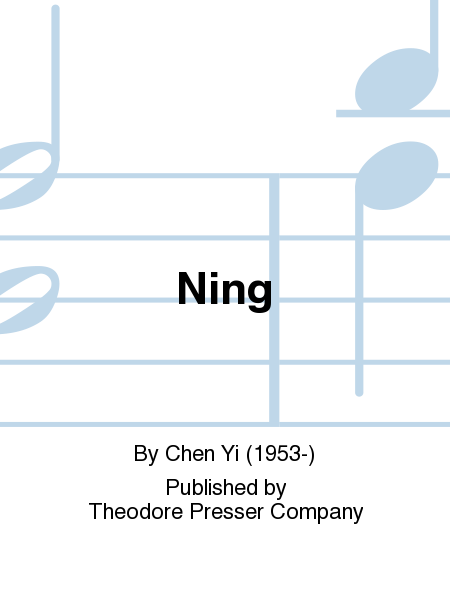Ning
For violin, Cello, and Pipa
-
Ships in 2 to 3 weeks
Details
Description
SKU: PR.114411330
For violin, Cello, and Pipa. Composed by Chen Yi. Saddle. Contemporary. Set of Score and Parts. With Standard notation. Composed 2001. 17+12+12+8 pages. Duration 15 minutes. Theodore Presser Company #114-41133. Published by Theodore Presser Company (PR.114411330).UPC: 680160016495. 8.5 x 11 inches.
The music is composed in a dramatic shape, symbolizing the sound of atrocious violence and tragic scenes, hysterical crying and miserable sobbing, gripping meditation, and illusive fantasy, performed on bowing and plucking instruments, combining unique styles and performing techniques in the music of the East and West, in an abstract form and texture.
The mixed trio Ning was commissioned by the Chamber Music Society of Minnesota and the Barlow Endowment for Music Composition at Brigham Young University, for the concert Hun Qiao (Bridge of Souls—A Concert of Remembrance and Reconciliation), to commemorate the little-known Asian Pacific Conflict of World War II. Premiered by Young-Nam Kim, Yo-Yo Ma and Wu Man on May 30th, 2001, at the Ordway Center for the Performing Arts in St. Paul (MN).The Chinese character “Ning” is another name of the city Nanjing, the capital of China during the World War II. “Ning” also means “serene and peaceful.” Remembering so many horrible true stories told by my parents repeatedly with anger and passion, who experienced the Japanese invasion in China, I sincerely accepted the invitation from the CMSM last year, to compose a piece of music for "calling the soul back to a resting place," to remember the Asian Holocaust 1937 Nanjing Massacre, and to look forward to the peace of the world in the future.The music is composed in a dramatic shape, symbolizing the sound of atrocious violence and tragic scenes, hysterical crying and miserable sobbing, gripping meditation and illusive fantasy, performed on the bowing and plucking instruments, combining unique styles and performing techniques in the music of East and West, in an abstract form and texture.—Chen Yi(born in China, 1953)“a major new work… The piece has structure, depth of emotion, a wealth of color and pure aural fantasy, and it ingratiates itself on the imagination with each subsequent hearing…the dark, even ghoulish intimacies of Chen Yi…” —Philip Kennicott, Washington Post, October 22, 2001“…a melancholy and sometimes terrifyingly visceral evocation of China during World War II.”—Allan Kozinn, New York Times, May 9, 2002“A sorrowful but hopeful mood…[a] subtly powerful lament for a homeland ravaged by war.”—John von Rhein, Chicago Tribune, October 27, 2002“…an angry musical response to the 1937 Massacre in Nanjing by the invading Japanese. The music is dramatic, with lacerating violence finally moving toward meditation and the blessing of souls. The composer’s compelling style bridges East and West, like the timbres of the instruments.”—Richard Dyer, Boston Globe, January 14, 2005.

 Share
Share